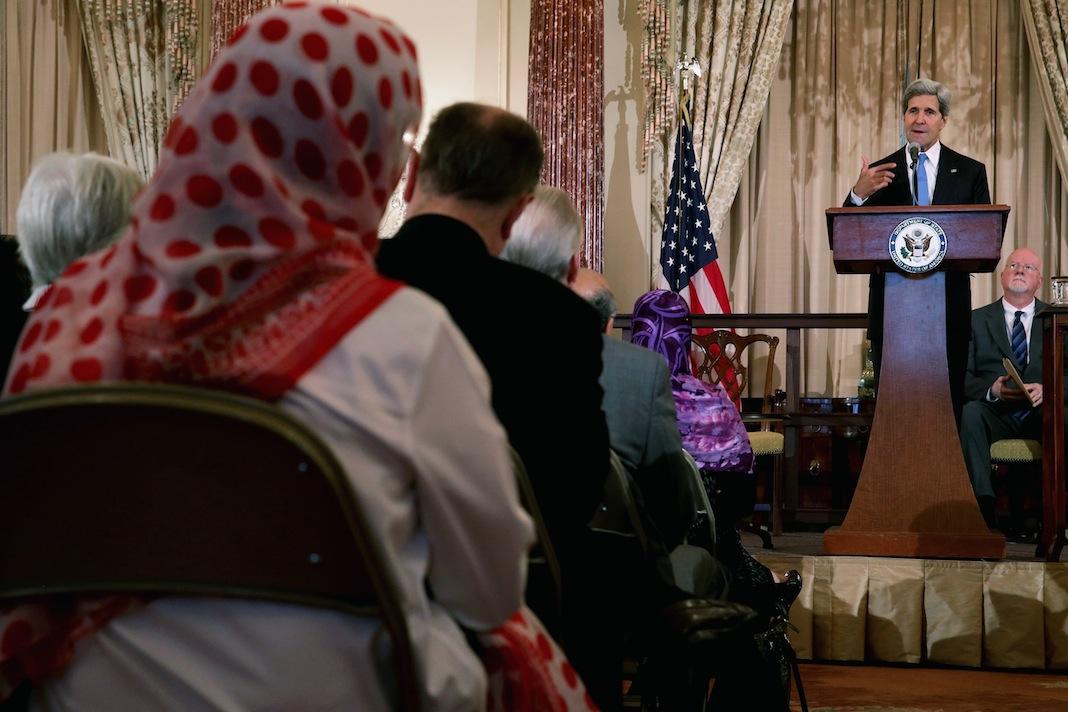US State Department embraces religion with new office
US Secretary of State John Kerry delivers remarks during an event to introduce Shaun Casey (R) as the head of the new State Department Office of Faith-Based Community Initiatives on August 7, 2013.
The State Department unveiled last week the plan to create the Office of Faith-Based Community Initiatives, focused on issues related to global religion, according to the Washington Post.
The State Department said the new office “will focus on engagement with faith-based organizations and religious institutions around the world to strengthen US development and diplomacy and advance America’s interests and values.”
The first of its kind, it will be led by Shaun Casey, a professor at Wesley Theological Seminary in Washington and a member of the United Methodist Church. He is also a long-time advisor to Secretary of State John Kerry, who said Casey is “perfect” for the position.
“I’m not naive,” Casey said. “I understand that this territory is fraught. But having said that, I think we ignore the political impact of religion at our peril.”
Kerry, echoing Casey's remarks, said Wednesday in a launch ceremony, “We need to recognize that in a world where people of all faiths are migrating and mingling like never before, where we are this global community, which we always talk about, we ignore the global impact of religion, in my judgment, at our peril."
Melissa Rogers, director of the White House Faith-Based Office of Neighborhood Partnerships, said, “The potential for religious communities to spark both positive and negative movement makes it essential for the United States to understand these communities and to engage with them. As the State Department does its work around the world, it must have a firm grasp of these dynamics and it must know how to address them in ways that are informed and intelligent.”
She noted three key objectives of the office: sustainable development, pluralism and advancing human rights, and preventing and mitigating conflicts.
While the US’ historical separation of church and state remains steadfast today, the issue is not as cut and dry for other countries.
Jacques Berlinerblau, a professor at Georgetown University and author of a recent book on secularism, said, “The best thing this office could do is present the United States as what it is, which is a pluralistic, multireligious society in which toleration, freedom of conscience and religious liberty are placed at a premium.
"As an office, if it models that, if it goes into Tunisia, Morocco, China, and says ‘Well, this is how we do it, would you like some advice? This is how we think about issues involving heresy, this is how we think about issues involving inter-religious strife, or the use of ceremonies in public places and symbols,’ it could be very, very effective.”
Casey said that he hopes to engage global religious leaders and communities to work together on issues that affect all nations, like climate change.
“There are fruitful ways for us to engage with some of those faith groups to see if we can’t have a multiplying effect on persuading other governments, and even perhaps people in our own society, that we need to do more to engage on rolling back global climate change,” he said.
In an increasingly connected world, religious matters continue to play a complicated role in politics.
Casey noted that one of his mentors once compared government involvement with religion to brain surgery because of its intricacies and potential for conflict.
“I have to be careful, I have to be diligent, I have to be inclusive. We have to do this office right,” he added.
We’d love to hear your thoughts on The World. Please take our 5-min. survey.
